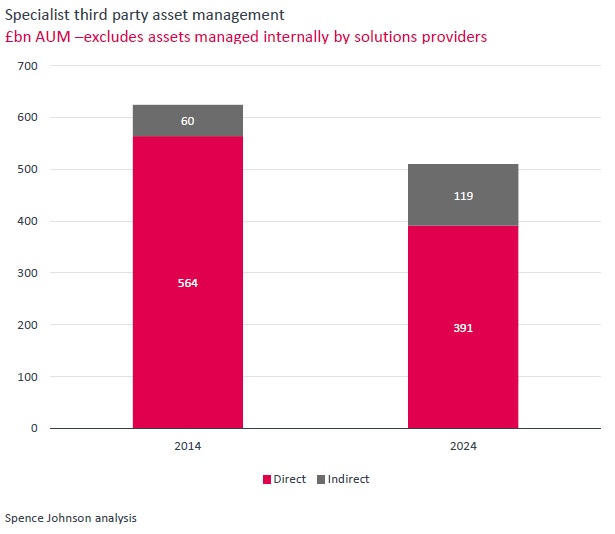By 2024, there could be just £117 billion ($177 billion) in defined benefit (DB) pension assets to share between fund managers who do not offer fixed income and liability-driven investment (LDI) in the UK, according to research.
The drop off in DB pensions, combined with a change in investor habits, will see a dramatic shrinkage in assets available to equity, hedge, and all other fund managers, consulting firm Spence Johnson has claimed.
“In 2024 we believe that only 30% of the addressable market will be managed outside of fixed income and LDI strategies.”In the UK, institutional assets totalled £2.6 trillion in 2014, with 53% owned by DB pensions, Spence Johnson said. Defined contribution funds made up just 10.5%, with other investors such as insurance companies and charities making up the rest.
“The total value of assets accessible to specialist third-party asset managers through direct relationships with DB schemes will decrease from £564bn to £391bn by 2024, due to the rise of solutions, insurance buy-ins, and the use of internal asset management—both within solutions providers, and within schemes,” the report said.
This would mark a 30% decrease in assets available to all managers. Additionally, Spence Johnson said there would also be a shift in what investors wanted.
“In 2024 we believe that only 30% of the addressable market will be managed outside of fixed income and LDI strategies,” Spence Johnson said.
This would leave just £117 billion available to those offering anything other than fixed income and LDI products through direct relationships with investors.
“We expect that LDI will grow significantly, as liability matching and cash flow management becomes a more important requirement for schemes as they mature,” Spence Johnson said. “In contrast, growth assets will fall as a percentage of the addressable market, with implications for equity and growth-focused alternatives.”
Furthermore, passive equity will become a more significant part of the total DB equity allocation, the report said. The growth in demand for matching assets, and capacity constraints in traditional hedging instruments such as index-linked gilts, will lead to a rise in popularity of matching alternatives, or “dirty hedges”, such as infrastructure debt.
However, there could remain hope for the rest of the manager universe in the form of indirect relationships, Spence Johnson said. This would mean managers working with so-called solutions providers and offering their products either alongside or co-mingled with others.
“We believe that the indirect channel will increase from £60 billion to £119 billion by 2024,” the report said. “This will however by no means fully compensate for the assets lost through the decline of the direct channel, and the rise of solutions will be a serious challenge to the specialist manager.”

Related: OCIO’s Next Targets: DC and Public Sector; Margin Pressures Force Managers to Think Long-Term; Pensions Should De-Risk with Hedge Funds, Consultants Say
